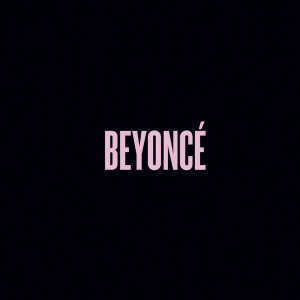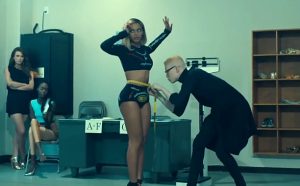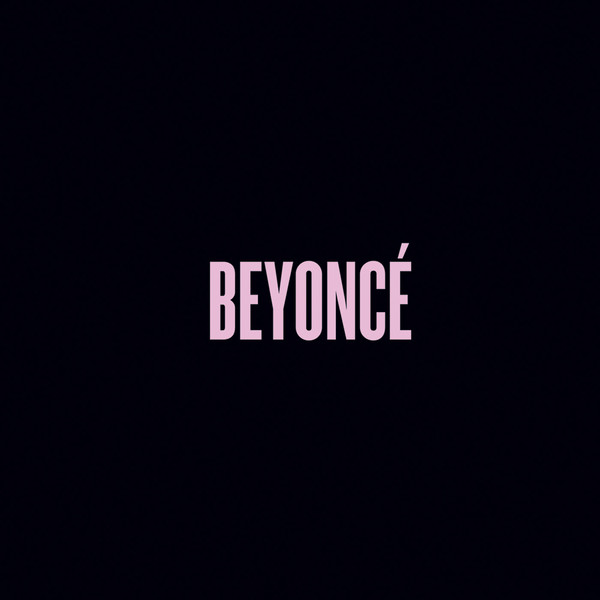by Montgomery Jones
At 12:01 a.m. on Friday the 13th of December 2013, history was made. Beyoncé released a surprise album. When I first heard, I thought I’d misread the Facebook post my SPARK sister had left on my wall. I checked Beyoncé’s Instagram: it was true. With a single post and a simple word–“Surprise!”–Bey unleashed a monsoon of tweets, tumblr posts, Facebook shares, Instagram photos, and texts.
thought I’d misread the Facebook post my SPARK sister had left on my wall. I checked Beyoncé’s Instagram: it was true. With a single post and a simple word–“Surprise!”–Bey unleashed a monsoon of tweets, tumblr posts, Facebook shares, Instagram photos, and texts.
I could barely take the fact that one of my favorite singers had surprised me with this beautiful little gift—and then I found out that Beyoncé wasn’t just a record. It was what she called a “visual album”–as in there is a video for every song and then some. The album, with its 14 singles and 17 videos, was released without an ounce of pre publicity: no interviews, no gimmicky preview tricks, no countdowns ’til the day it dropped. As a public relations major, this astounds me. Can you imagine the power you have to have in order to announce you have an album, release it at the same moment, and then have it shoot to number one immediately? So many artists struggle with singles and albums being leaked in advance of their pre scheduled release dates. How one of the biggest artists in the world managed to sneak past gossip bloggers, fans, and speculators will be questioned for ages. In a day and age when a celebrity cannot sneeze without being on TMZ or Perezhilton.com, it’s crazy to think an entire album and 17 companion videos (many of which were filmed in public!) managed to slip through almost entirely unleaked. Suffice to say this was a pretty big deal to everyone and their mother—the music industry will basically never be the same. And to top it off, Beyoncé used this album to tell all those who question her feminism and power to take a step back.
Feminists and non-feminists alike have questioned whether Beyoncé could ever truly be a feminist. She’s too sexual and aims to please men, her last tour was called “The Mrs.Carter Show,” she teaches young girls the wrong message, onward and so forth. But with songs like Pretty Hurts, Partition, and Flawless, she essentially puts all naysayers to shame. Flawless is the new anthem for feminists ’round the world. I am calling it that because so rarely is there a song that gives the very definition of feminism in the song. Bey samples Nigerian author Chimamanda Ngozi Adichie’s Ted Talk:
“We teach girls to shrink themselves, to make themselves smaller. We say to girls, you can have ambition, but not too much. You should aim to be successful, but not too successful. Otherwise, you would threaten the man. Because I am female, I am expected to aspire to marriage. I am expected to make my life choices always keeping in mind that marriage is the most important. Now marriage can be a source of joy and love and mutual support but why do we teach girls to aspire to marriage and we don’t teach boys the same? We raise girls to see each other as competitors not for jobs or accomplishments, which I think can be a good thing, but for the attention of men. We teach girls that they cannot be sexual beings in the way that boys are. Feminist: a person who believes in the social, political, and economic equality of the sexes.”
Flawless seems like a later version of a controversial song leaked earlier this year, “Bow Down.” Ironically (or maybe not), “Bow Down” caused the people to question Beyoncé’s feminist ideals more than any other song. That this now an anthem for the sisterhood of feminism is no coincidence in my opinion. Good one, B.
Partition is extraordinary on 30 levels: A) We hear Beyoncé rap. B) She refers to herself in third person, as “Yoncé,” also the title of another track, and C) most importantly, Miss B has another sample to help explain feminism, this time from The Big Lebowski, a quote that says in French “Do you like sex? Sex. I mean, the physical activity. Coitus. Do you like it? You’re not interested in sex? Men think that feminists hate sex, but it’s a very stimulating and natural activity that women love.” Most feminists have encountered the “but don’t you hate men?” thing at least once. Now all we need to do is play this super rad tune and say “let the Queen explain.” Throughout the album, sexual liberation for women is a reoccurring theme. It’s okay for a woman to be sexual! As Beyoncé shows us over and over, it’s not just male rappers who get to talk about engaging in sex and receiving oral sex.
Yoncé the music video features the top black models in the business. Chanel Iman, Jourdan Dunn, and Joan Smalls come together with Beyoncé, forcing critics to see that they stand as one. The media continuously pits them against one another, so it’s refreshing to see some of them top black females in the entertainment industry stand strong. Beyonce once again gets the last laugh as she taunts the headline’s attempts to ensure only one black woman can be on top.
 Pretty Hurts has lyrics I could easily see a Dove commercial sampling. Calling out beauty culture, Beyoncé says “perfection is a disease of a nation.” It’s well known that Beyoncé was in the pageant circuit as a child, an industry that prides itself on making pretty hurt. The video for this single is almost what would happen to Beyoncé had she not become the superstar she is today and continued to do pageants. With clips of her forcefully throwing up, crying alone, putting on loads of makeup, and going through facial surgery, Pretty Hurts actually hurts to watch. I would think this song and video’s message are pretty transparent, but with The Daily Mail praising Beyoncé’s “trim waist” in the music video, I think again, maybe not.
Pretty Hurts has lyrics I could easily see a Dove commercial sampling. Calling out beauty culture, Beyoncé says “perfection is a disease of a nation.” It’s well known that Beyoncé was in the pageant circuit as a child, an industry that prides itself on making pretty hurt. The video for this single is almost what would happen to Beyoncé had she not become the superstar she is today and continued to do pageants. With clips of her forcefully throwing up, crying alone, putting on loads of makeup, and going through facial surgery, Pretty Hurts actually hurts to watch. I would think this song and video’s message are pretty transparent, but with The Daily Mail praising Beyoncé’s “trim waist” in the music video, I think again, maybe not.
Destiny’s Child was the first concert I ever want to. As an eight-year-old half black girl, having idols that were my color meant more to me than I knew at the time. Kelly, Michelle, and Beyoncé were like the big sisters I never had. Beyoncé has always seemed so gracious and kind all while keeping up the regal essence she carries so effortlessly. I joke that Beyoncé is perfect and call her Queen, but I do know she is a human being who makes mistakes. I was very disappointed with the “Anna Mae” reference in “Drunk in Love”. I know she is not perfect–as none of us are–and I have accepted that my idol is flawed. But Beyoncé is a feminist whether you want her to be or not. She is fighting the good fight. She’s not a rocker grrl on an indie label, but she is able to reach a much wider audience then most. This visual album was her most personal to date with talks of her sex life, motherhood, feminism, and general pressures in life. With special guests like Frank Ocean, Drake, and Jay-z, and THE Blue Ivy (her 1 year old daughter), this album was a well thought out plan of attack in the world domination that is BEYONCÉ. Be prepared for more “surprise” albums because Beyoncé has forever changed the game of music releases. Every artist will want to prove that they too can stir up such a frenzy. Some might, but most won’t–because who else has Beyoncé’s reach and power? No matter who follows in Beyoncé’s footsteps, it will forever be known as one of the biggest music risks out there. Mission accomplished Sister B.

Beyonce is using feminism as another marketing strategy. How can she be a feminist if she’s dancing half naked while her hubby is fully clothed beside her? She’s clearly the object in the relationship.
And her anna mae reference completely ruins any feminist qualities she could have had: she simultaneously makes light of domestic violence and disrespects an actual strong feminist. Honestly, she must have heard the backlash by now. But she has not apologized, and she still performed that song at the grammys.
Sorry, all. Maybe she could have been helpful to us once, but she has long left behind any feminist potential. She’s married to her money.